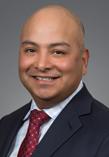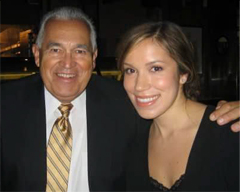© 2017 The Texas Lawbook.
Embracing the opportunities we are given
By Chris Mugica
A veteran of both World War II and the Korean War with an innate sense of family and an exceptionally strong work ethic my maternal grandfather, Manuel, was someone that people naturally looked up to. And I was certainly no exception.

As a child born to teenage parents that divorced before I was 2 years old, growing up in East Austin in a lower socioeconomic class seemed to predestine me for a lifetime of strife and struggle. However, my grandfather loomed large and, as my family’s patriarch, he ensured that his grandson would learn and appreciate how his hard work and perseverance helped him accomplish success in his life.
I still recall the stories he told me in high school about his life at the same age – hitchhiking to nearby towns to pick crops all day long, then hitchhiking back home to help care for his siblings in a small home in Round Rock, Texas. That daily routine continued until he enlisted in the Army at 16 or 17 (and later the Navy.) His stories taught me lessons of brotherhood, teamwork, and perseverance, that the group is stronger than the individuals, that dedication to a higher purpose will overcome obstacles. As his time of service was during a period of history in which our country was still mired in issues of segregation and discrimination, without saying it, he showed me the importance of taking pride in being the best possible representative of our culture to the rest of the world.
His lessons were far-reaching and often not so subtle. Neither of my parents completed high school and I was the first of nine siblings to be accepted to college. Although I took that seriously, I was still a young man ready to enjoy the new experiences that college offered, even if I was living with my grandparents. After one particularly long night out on the town, my friends and I were awoken at 6 a.m. as my grandfather burst into the room to make sure we were up and headed to classes – and he made sure to remind us to make the bed before we sat down for breakfast. His message was simple. I had been given a chance so many others would never have. I needed to hone my work ethic to ensure I did not squander my opportunities to succeed.
I take seriously my responsibility to be that same type of mentor to my professional family as well as the young members of the Austin community, especially those in underrepresented classes.
I was honored to serve as the hiring partner for Jackson Walker’s Austin office for several years, before stepping down in order to become head of this office’s litigation group. I have likened it to going from being a rush chair, trying to convince the most promising young attorneys to join us, to becoming the professional coach who is helping bring out the best in each individual.
With respect to advancing the profession, I had the privilege of being Jackson Walker’s first fellow in the Leadership Council for Legal Diversity and have served on the steering committee for the State Bar of Texas Minority Counsel Program. With both organizations, I proudly accepted leadership positions to help effectuate change in the legal profession to ensure equal opportunities for all attorneys, regardless of gender, race, creed, or sexual orientation.
But more important to me than my professional peers are the youth of Austin. I was lucky to have become involved in the Young Men’s Business League of Austin’s Sunshine Camp as a pre-teen camper, and later as a counselor and camp director. It was my first glimpse at what the world was like outside of my own small bubble. And it opened my eyes in a way I expect the military opened my grandfather’s eyes. I got so much from them that I feel compelled to keep giving back. That’s what led me to serving on the league’s board, as well as leadership roles with the Capital Area Council of the Boy Scouts and National Campaign to Stop Violence’s Do the Write Thing Challenge.
I have been humbled over the years when people have termed my life as a real “Horatio Alger” story, having pulled myself up by the bootstraps to become the person I am today. But the reality is that has been a much more nuanced story. One that never would have been possible without the lessons my grandfather taught me about the responsibility we have to embrace the opportunities we have been given and then ensuring we help others reach their fullest potential.
Chris Mugica is head of the litigation group of Jackson Walker’s Austin office.
From Migrant Worker to Business Owner, Guided by My Father’s Example
By Nina Valdez
The pride I feel for my Mexican-American heritage comes straight from my father. Growing up, he instilled in me and in my sister the importance of education because of the challenges he experienced as a migrant worker in south Texas. I still remember his stories of the discrimination he faced growing up – from eating in the back of restaurants to being severely reprimanded in school for speaking Spanish. It saddens me to know that he and many others experienced discrimination based on their race.

My father’s struggles drove me to become an attorney. I was motivated to be in a position where I could argue for justice – for what is right. I knew I would have to work very hard to get there, but I was fortunate to have a real life role model. My father put himself through college at Texas A&M University, while working a full time job. He also earned an MBA from the University of Texas at Austin.
His constant words of encouragement still resonate today – if you work hard enough there is nothing you cannot achieve. He succeeded in his career in banking regulation and as an entrepreneur with a small electronics business. Helping my dad manage his business gave me the knowledge I use today in my work as a commercial litigator. It is more than just understanding the basics of owning a business. It’s understanding and appreciating the tremendous emotional value that comes with being a business owner.
I still carry my father’s words with me. They serve as the basis for my work ethic and resiliency despite life’s inevitable obstacles. I remember studying for the bar exam and being so tired and stressed, but I thought of my dad and the obstacles he had overcome. The bar exam paled in comparison.
 As Hispanic Americans, knowledge of the hardships experienced by those before us propels us to achieve. As a former prosecutor with the Dallas County District Attorney’s Office, I have amassed 22 trials with an 83-percent win rate. I’m now working with the Rose Walker firm practicing commercial litigation; I’m surrounded by the best trial attorneys. I’m in my element, helping to defend companies in complex litigation. My father’s experiences and my Hispanic heritage are the catalyst, and I am thankful for it. But I’m not done.
As Hispanic Americans, knowledge of the hardships experienced by those before us propels us to achieve. As a former prosecutor with the Dallas County District Attorney’s Office, I have amassed 22 trials with an 83-percent win rate. I’m now working with the Rose Walker firm practicing commercial litigation; I’m surrounded by the best trial attorneys. I’m in my element, helping to defend companies in complex litigation. My father’s experiences and my Hispanic heritage are the catalyst, and I am thankful for it. But I’m not done.
Nina Valdez is a commercial litigation attorney for Rose Walker LLP.
Why Diversity in the Legal Industry Demands Balance
By Andrés Correa
In late 2016, I found myself making opening and closing arguments in front of a West Texas jury, asking them for more than $100 million in damages on behalf of our client, T. Boone Pickens. At the time, I was a seventh-year associate. My co-counsel – seasoned, highly accomplished trial lawyers Mike Lynn and Chrysta Castañeda – were watching closely, no doubt hoping I wouldn’t mess it up.
I was standing in front of the jury that day for several reasons, not least of which was because the folks in that jury box were nearly 100 percent Hispanic. I am a native of Chile, fluent in Spanish, who immigrated at age 11.

One of the most common worries of young minority lawyers is being trotted out in front of clients, judges or juries who share their ethnicity or race. So should I have worried?
A few weeks after the verdict, my firm welcomed me into its partnership. As I consider the challenges of business development, I wonder daily whether my “otherness” in America is an advantage as many believe – or an obstacle as it has been for hundreds of years. So once again I ask myself: should I worry?
There’s ample evidence for concern. It defies common sense to believe that America’s 200-year history with racism has no consequences today. Many of us are familiar with – or have directly experienced –the persistent biases against educated, professional members of a minority group when applying for a job or submitting their work for evaluation. I have been told to go back to my country, and that I’ve only succeeded thanks to affirmative action.
But that’s not the whole story. I was born in a humble neighborhood during a dictatorship. After immigrating, I lived in east New Orleans, where I witnessed stabbings and lost friends to gun violence. And yet today, here I am – – the first Hispanic partner at one of the top four litigation firms in Texas.
As a litigator, I have learned that no story is without its nuance. I firmly believe that, as an immigrant and a minority, I have to be better than my majority counterparts in order to be considered their equal. But those same majority counterparts have welcomed me into their fold. They have not just allowed me to shine, they have shared the tools to succeed.
As minorities in the corporate world, we must walk a fine line. I cannot forget where I came from or look away from the injustices facing those who look and sound like me. I must also give my all to my clients, who come to the firm for solutions. I also have an obligation to help my business grow.
This balancing act is demanding, but we each have our own balancing acts, no matter our race or ethnicity. The best we can do is try to understand each other. Majority lawyers should do their best to understand the perspectives of their minority colleagues, while at the same time, minorities must tactfully share our experiences while listening to and acknowledging the perspectives of our majority colleagues.
All of this informed me – directly or indirectly – as I wrapped up my argument in that West Texas courtroom. With less than two hours of deliberation after a two-week trial, the jury awarded our client, Mr. Pickens, $146 million. It was not because of me. Our team – two well-known trial lawyers, preeminent appellate counsel, accomplished local counsel, and highly capable associates, as well as paralegals and secretaries – worked tirelessly for months to win, and we all played a role. Our client himself was the trial’s star witness.
That victory resulted from the hard work of a diverse team, which confirms what research has repeatedly shown: in business, a diverse team is the best team.
Before worrying too much about why it was me in front of the jury, I remind myself that I would have never set foot in that courtroom if I had not first earned my place in my high school, in undergrad, law school and within the ranks of my firm. And I know my team would have never thrown me into that challenge without the conviction that I could succeed.
Ultimately, excellence begins with your state of mind. No matter your race or origin, you must focus first on excellence, both as a lawyer and also as a person. Throw a little empathy and patience into the mix, and there should be nothing we cannot overcome as a team.
Andrés Correa is a partner at the law firm Lynn Pinker Cox & Hurst.
© 2017 The Texas Lawbook. Content of The Texas Lawbook is controlled and protected by specific licensing agreements with our subscribers and under federal copyright laws. Any distribution of this content without the consent of The Texas Lawbook is prohibited.
If you see any inaccuracy in any article in The Texas Lawbook, please contact us. Our goal is content that is 100% true and accurate. Thank you.
